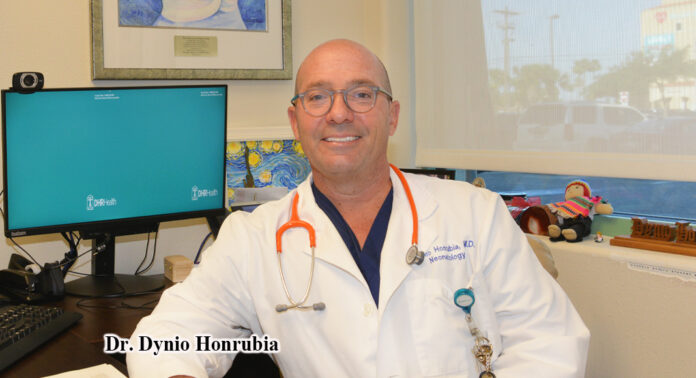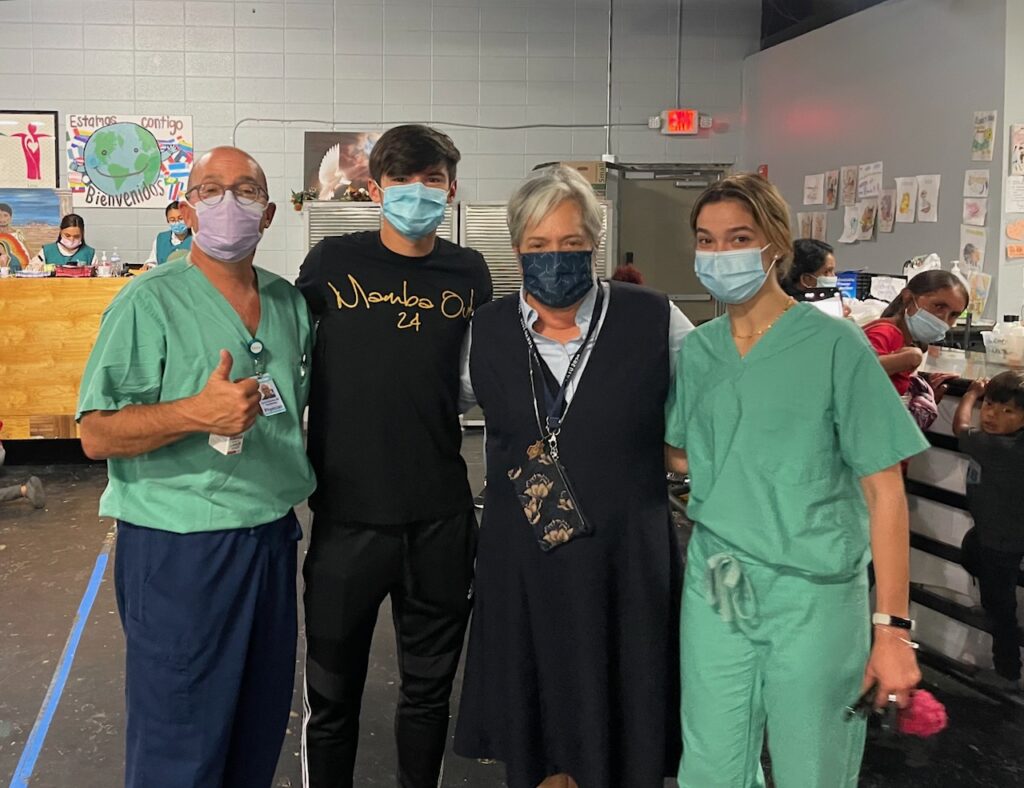Mega Doctor News
By Roberto Hugo Gonzalez
I was eager to meet the physician that, together with his children, has used his free time and money to help others. Dr. Dynio Honrubia is such a man. He has collaborated frequently with Sister Norma Pimentel, a religious sister of the Missionaries of Jesus. Sister Norma is now a familiar name and face. She is known for her compassion and hard work in assisting thousands of migrants who cross the river into the United States to seek help and better opportunities for themselves and their families.
The Honrubias have worked on projects to help those who patrol the Rio Grande River through Sister Norma. On multiple occasions, the U. S. Customs and Border Protection agents have helped migrant women deliver their babies right at the riverbanks in the middle of nowhere.
Many of the agents don’t have the experience of delivering a baby; some don’t even have children. When an emergency happens, they don’t always have the necessary training or medical tools. This is when Dr. Honrubia and his son Vincent come into this story.
Dr. Dynio Honrubia told Texas Border Business that they, “follow Sister Norma’s lead”. They assist her in anything that she needs. The need that prompted his son Vincent into action is that migrant women sometimes give birth just as they have crossed the Rio Grande River.
Vincent decided to help Sister Norma by creating emergency childbirth kits to help and equip border patrol agents should the need to deliver a baby in the field arrive.
Dr. Honrubia described the maternal packet which includes a scalpel, cord clamps, and a birthing pad. The baby packet consists of a baby hat, blanket, diaper, and bulb suction. “Vincent put together fifty kits. He funded the project and donated his time to learn about the problem, educate himself about childbirth, and then design, order, and create the kits.” Dr. Honrubia said, “now Vincent is looking for additional resources for what we and the leadership at Border Patrol believe to be a project that can benefit and educate officers nationally regarding emergency childbirth.”
“Vincent is working on getting kits done on a greater volume because it seems to be a practical teaching module,” explained Dr. Honrubia.
Vincent’s philanthropy activities do not end there. He has volunteered his time at Catholic Charities of the Rio Grande Valley since he was 8 years old. He donated soccer equipment to migrant children and families in the Matamoros, Tamaulipas refugee camp. He also loves playing soccer; he was very happy to see the children of the refugee camp, along with Sister Norma and Dr. Honrubia, playing a soccer game with his soccer equipment!
Dr. Honrubia is satisfied with Vincent’s performance; he said, “My wife Melanie and I are hopeful that he will see sister Norma as more than a mentor, but someone to emulate, keep helping, and strive to behave like as he matures. That’s the idea.”
Dr. Honrubia also said that Mia, his older daughter, began volunteering at Catholic Charities when she was 11 years old. She is now at Cornell University and has been part of helping those in need. She is responsible for collecting books for migrants, aside from helping in the pharmacy at Catholic Charities RGV.
——See Slideshow Below ——
“I have a third child, she’s 9 years old. Her name is Noa. She is volunteering already. Her first project was to help put together pregnancy kits for women at the refugee camp in Matamoros; once again under the leadership of Sister Norma. So, all the kids have volunteered and have done their best and in return have become more empathetic Christians. That’s the plan.”
Dr. Honrubia said that Sister Norma is a blessing to his children in so many ways. “I mean, she’s a blessing to all of us, but for these young kids looking for role models and looking to someone who’s doing something purely to help others. We’re incredibly fortunate.”
During the conversation, I asked, is Dr. Vincent F. Honrubia, F.A.C.S. part of your family?
“Yes, the same family… he is my big brother, a board-certified ear, nose, and throat – head and neck surgeon. He operated on my sinuses; I breathe great because of him!”
He continued, “He followed the footsteps of my father, Dr. Vicente Honrubia, Sr., a vestibular neuroscientist and an ear, nose, and throat doctor at UCLA. My dad is now an Emeritus Professor of Surgery at UCLA.”
What about your mom?
“My mom is Dynia Honrubia. She graduated from the University of Chicago with a master’s in history. She also has an advanced degree in education and was a schoolteacher in East Los Angeles.” He said, “She has a huge, giving heart, and has spent her life sacrificing and caring for those who need education the most. I believe my awareness to help, and volunteer comes from watching her, as she spent thirty plus years teaching kindergarten to truly underserved kids in central-east L.A. My mom is full of empathy and did a great job. Yes, that’s all I need to say about that!”
Dr. Dynio Honrubia is the Medical Director of the Neonatal Intensive Care Unit (NICU) at DHR Health Women’s Hospital (DHRH WH). He went to UCLA as an undergraduate and got a degree in history.
Then he attended medical school and received his medical degree at the David Geffen School of Medicine at UCLA. He completed his pediatric residency at UCLA/Cedars-Sinai Medical Center and then completed his training in Neonatal-Perinatal Medicine at the Harvard Medical School and at Boston Children’s Hospital. While at Harvard, he was also a post-doctoral fellow in the Morton Hearing Laboratory, a laboratory that focuses on discovering genes involved in deafness. He said, “So I did that while learning Neonatology, and then after I graduated, I returned Los Angeles and served for 3-years as an assistant professor of Pediatrics at UCLA.”
Dr. Honrubia left UCLA and moved to the Valley in 2007 to help open the NICU at DHR Health Women’s Hospital. “I’ve been working happily in the Valley ever since, and that’s been 15 years just working in the NICU, caring for the babies. I still can’t fish or play golf!”
Readers will find it interesting that 8,000 babies are delivered every year at DHR Health Women’s Hospital.
“We have about 120 of the smaller babies, the very low birth weight babies born a year, and we’ve become somewhat of a referral center for these high-risk newborns.” He said, “It’s a real collaborative team effort within our NICU, we are all cogs in our NICU wheel. And my partners Dr. Emil Milano and Dr. Jyothi Swarup, in my opinion, they’re far more Mega Doctors than me, every day of the week.” He said, “They’re just great professionals; we run a truly ethical, moral unit together, where babies and parents always come first.”
The unit is more than just a NICU. Honrubia says, “We have many added aspects to this unit. We have a high-risk infant follow-up clinic where we watch the high-risk baby’s transition to home, and their neuro development, and we also participate in clinical research.”
Currently, Dr. Honrubia is the principal investigator in five different research projects. He said, “We collaborate with my previous laboratory at the Harvard Medical School and we’re doing an innovative genetic hearing study where we are helping to understand and discover the individual genes that are involved in hearing and deafness.”
They are beginning another hopeful collaboration with Harvard, looking at babies with neurologic disorders that have yet to be diagnosed. They are also doing studies on vaccines and feeding practices. “In essence, we deliver babies, and love and take care of them during their time in the NICU, follow them developmentally after they graduate from the unit, and also, help the greater community of neonatology by contributing our time to clinical research.”
Dr. Honrubia is proud to say that DHR is the donor milk bank of the Rio Grande Valley. Aside from that, there is a NICU library reading and music program. He said, “All these services are unique to the NICU environment and have been developed over the last 14 years.”
He said the NICU is a complex environment because it has many aspects to it. “One aspect of great importance regarding our NICU’s care of babies, is that since our NICU was opened in 2007, we have been highly accountable to our community and our families and have participated in Neonatology’s international outcomes network. It’s called the Vermont Oxford Network; it is run by the American Academy of Pediatrics. Every one of our babies participates anonymously in that network in order to prove our Unit’s quality and to also improve our Unit’s quality every year.”
What inspired you to be a doctor?
“In a sense, what inspired me to be a doctor was volunteerism. I was not sure I wanted to be a doctor. One day, my brother Vincent Honrubia had volunteered at a clinic in Venice, California, called the Venice Family Free Clinic, which was mostly a homeless clinic at the time. My brother told me that maybe I’d like to go check it out. And so, I went, and I volunteered. It just clicked; I wanted to pursue this profession.”
“I volunteered for several years at the clinic, helping the pediatric patients whose moms were homeless. From there, I went to medical school and did a rotation in pediatrics in the NICU, and I fell in love with the babies,” he said.
Now, getting back to delivering babies at the banks of the river. Dr. Honrubia developed the module to address Emergency Childbirth. It was a team project: he created the didactic PowerPoint lecture, Dr. Flor Limas and the labor and delivery team at DHR Health Women’s Hospital created an emergency childbirth video utilizing their teaching mannequin and Vincent’s kits. The module was handed to the Border Patrol for vetting purposes and later will be used to train agents to deliver babies during emergencies along the Rio Grande River.
Dr. Dynio Honrubia is a Medical Director of the Neonatal Intensive Care Unit at DHR Health Women’s Hospital.
Sister Norma Pimentel is a religious sister of the Missionaries of Jesus and serves as Executive Director and a licensed professional counselor for Catholic Charities of the Rio Grande Valley. She provides oversight of the different ministries and programs in emergency assistance, housing assistance, counseling, pregnancy care, and humanitarian aid.
Dr. Dynio Honrubia who enjoys collaborating with Sister Norma finalized, “We can all contribute and make a difference.”















